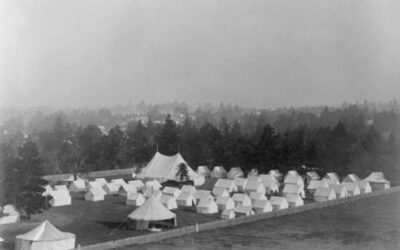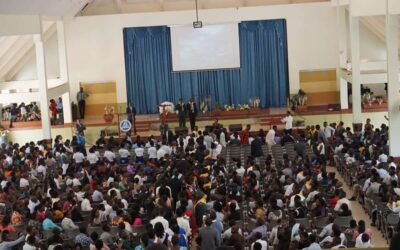Wondering whether your Seventh-day Adventist classmate or coworker keeps the same holidays you do? Perhaps you want to include them in some festivities, but you also want to make sure you respect their beliefs.
Officially speaking, there is no statement or belief within Adventism (or the Bible) that deals with if or how holidays should be celebrated. Most Adventists typically celebrate major holidays, such as Christmas, as well as many local or national holidays.
Though traditions and celebration styles may vary among individual families, cultures, or communities, here’s a look at how Adventists generally regard the following popular holidays.
And keep in mind that while there are no “rules” for how Adventists treat these holidays, we always encourage one another to find special ways to uphold biblical principles and reflect the character of Christ.
What holidays do Adventists celebrate?

Photo by Cristian Escobar on Unsplash
Most Adventists keep major national and patriotic holidays. However, some might choose to avoid certain ones because they feel they conflict with their beliefs, priorities, or opinions.
In some cases, an individual, family, or community might recognize a holiday but prefer to celebrate it differently or omit some common traditional activities.
The Seventh-day Adventist Church intentionally does not have an official statement about celebrating holidays. The Bible also doesn’t include any holiday-specific commandments or advice, mostly due to the fact that most modern holidays didn’t exist back then. Also, most holidays in general don’t present a moral issue.
In other words, it’s not a sin to keep or disregard holidays. Instead, this is a matter of conscience and applying the principles found in the Bible to make individual decisions.
Adventists don’t have any special holidays of our own, and we believe that all are free to decide for themselves which holidays to keep.
When it comes to religious holidays, most Adventists don’t observe Hebrew “holy days,” or religious festivals or feast days like Passover. This is because these occasions were specific to Mosaic law—meaning they were designed for the Israelite nation in the Old Testament (Exodus 12:43–49) and were connected with the system of animal sacrifices (Numbers 9:6–7).
These sacrifices ultimately pointed forward to the sacrifice of Jesus on the cross. Now that Jesus has died and resurrected to fulfill these symbols, Christians are not required to sacrifice animals or keep the feast days.
That doesn’t stop us from enjoying modern holidays and cultural traditions, though.
So what is it that guides Adventists’ approach to holidays?
Even though the Bible doesn’t mention “holidays” like we understand them today, it does give us valuable principles to apply. It outlines behaviors or associations we should avoid (greed, pride, spiritualism, etc.), and explains what attitudes we should strive toward (generosity, joy, thankfulness, etc., Galatians 5:22-23).
In the end, keeping holidays comes down to how they impact:
- Our beliefs
- Our behavior
- Our treatment of others
Our greatest desire is that every holiday we keep would draw us closer to Him and give us opportunities to share His love with others.
But let’s take a look at these common holidays and how Adventists apply the above principle when celebrating them.
Christmas

Photo by S&B Vonlanthen on Unsplash
Like most families, the majority of Adventists celebrate Christmas. In some countries, particularly in North America, it’s seen as a special opportunity to celebrate the birth of Jesus, though in many parts of Africa, it’s more common for Adventists to see Christmas as a time for family. Families may travel back to their ancestral homes or villages and spend time with one another. They might prepare a special meal and gather everyone together.
In larger cities, some Adventist churches decorate their buildings and hold Christmas programs about the birth of Jesus. These are often specifically for children.
Some Adventists—like many Christians in other denominations—choose not to keep mainstream Christmas traditions because they’re concerned about their origins or their focus. Or they may be concerned about the potential greed and selfishness this holiday can inadvertently stir up.
Ultimately, it’s the personal decision of each Adventist church member.
Easter
Adventists’ celebration of Easter depends on what part of the world you’re in. Though Easter is a major holiday in many parts of Africa, Adventists there typically choose not to celebrate Easter because of concerns about it origins and its association with pagan practices. They also choose not to celebrate other Easter-related holidays like Lent, Ash Wednesday, Good Friday, and Palm Sunday.
In North America, however, many Adventists do celebrate because they see it as a time to commemorate Jesus’ resurrection—a central theme in Adventism and Christianity. Though we recognize the importance of Jesus’ resurrection throughout the year, Easter is a great time to remember what Jesus did for us and share that with others. For this reason, Adventist Churches in these areas may have special services on the Sabbath before Easter, emphasizing the resurrection of Jesus.
Birthdays

Photo by Ron Lach
Many Adventists celebrate birthdays as a way to celebrate the life God has given us. But again, these celebrations will depend on where you live. In some countries in Africa, birthdays aren’t emphasized as much, though families may celebrate their children’s birthdays with parties, cake, and birthday songs.
It is possible to find a person or family that has made a personal decision not to celebrate birthdays. It may be because they don’t want the limelight on themselves or their children, or maybe they don’t want to encourage a fixation on presents, junk food, noisy parties, etc. It’s a matter of preference.
But the vast majority take birthdays for what they are—opportunities to celebrate life.
Whether we hold a party or simply spend quality time with our families, birthdays can be a way to thank God for another year of life and look back at how He’s helped us grow throughout the past year.
New Year’s Eve and Day
Adventists typically recognize the New Year, although the amount it is emphasized or celebrated varies from person to person. Many Adventist churches will hold prayer and thanksgiving gatherings on New Year’s Eve, waiting for the clock to strike midnight and asking God to guide them in the upcoming year.
New Year’s Day doesn’t usually involve any special church services, though on the following Sabbath, the pastor may preach a sermon of thanksgiving for the Lord’s care through the previous year.
On New Year’s Day itself, families will often gather together for a special meal. They might also visit parks and spend time relaxing with one another and taking part in community events or activities.
Patriotic holidays

Photo by Elisha Terada on Unsplash
Adventists often participate in patriotic holidays too, taking part in their countries’ respective independence celebrations or memorial occasions.
In many countries in Eastern Africa, people gather in stadiums to hear the president of the country address them. These events might also have parades of the different army units, national prayer, and traditional dances.
Adventists take the time to enjoy these events and days off work. They might spend time as a family, go for leisurely walks, or visit an animal park as a way to relax.
Whatever the occasion, Adventists use these holidays to be with family and reflect on the beauty, joy, and freedoms they find in their respective countries. It can always be a good idea to take time to focus on the positive things in our lives and be thankful for occasions to celebrate.
Commercial/Hallmark holidays
Celebrating commercial holidays, sometimes known as Hallmark holidays, is again a personal choice for Adventists. Throughout the world, perhaps the ones that Adventists celebrate most are Mother’s Day and Father’s Day, taking the time to show how we value these family members in our lives.
When it comes to other holidays like Valentine’s Day and St. Patrick’s Day (in North America), some choose to celebrate them, and others do not. It really comes down to personal preference.
Biblical principles guide Adventists in holiday-keeping
Adventist church members have the freedom to follow their consciences in choosing which holidays to keep or how to keep them.
Because God gives us this freedom of choice, we give that same freedom to others, simply encouraging everyone to maintain a Christ-like attitude while celebrating.
How we celebrate or commemorate anything is a personal decision. And by asking the Holy Spirit for guidance and seeking to honor God through our application of the Bible’s principles (1 Corinthians 10:31), we can approach each holiday with gratefulness and joy.
Even though there are no holidays specific to Adventism, there is one “holy day” that Adventists celebrate every week: the Sabbath that God created.
The Sabbath is a wonderful time to unplug from the obligations of the workweek, worship God, and rest with Him and family and friends.
Related Articles
More Answers
What Is an Adventist Book Center (ABC)?
When you walk into any one of the many Adventist Book Center (ABC) locations, chances are you’ll be greeted by pleasant gospel music in the background, friendly employees, and row after row of Christian books, movies, Bibles, study guides, kids’ games, and more.
A Look at Adventist Colleges and Universities
On the outside, Seventh-day Adventist universities may not look much different than other college campuses. But the real differences are beneath the surface.
What Are Pathfinder and Adventurer Clubs?
What Are Pathfinder and Adventurer Clubs?Like the boy or girl scouts, Pathfinders and Adventurers learn about nature and life skills. But what makes these clubs special is their purpose to bring young people closer to Jesus. If you’ve wondered about Pathfinder or...
What Is a Seventh-day Adventist Camp Meeting?
Although camp meetings didn’t begin with the Seventh-day Adventist Church, they’re very common to Adventists.
Do Seventh-day Adventists Believe Only They Will Go to Heaven?
No, Adventists definitely don’t believe they’re the only ones that will go to heaven. As a matter of fact, we don’t believe admittance into heaven is ever based on which church or denomination we belong to. People all over the world from different Christian denominations, religions, and walks of life will be welcomed by Jesus Christ.
How Adventists Handle Death and Funerals
Most Seventh-day Adventist funeral services are similar to those of other Protestant denominations, such as Methodists, Baptists, or Presbyterians, but you might find a few differences or unique nuances.
Does the Adventist Church Have Youth Ministry Programs?
Does the Adventist Church Have Youth Ministry Programs?The Seventh-day Adventist Church has been organizing and operating youth ministry programs since 1879. In our opinion, youth ministry is one of the most important ministries a church can have. Being a tween or a...
How does one become a Seventh-day Adventist?
To be a Seventh-day Adventist Christian means to accept Jesus Christ as Lord and Savior. This means to recognize that Jesus alone can save you from sin and death (Savior) and to give Him full authority over your life (Lord and Master).
What Are Adventist Evangelistic Meetings?
The Seventh-day Adventist Church puts a huge emphasis on sharing the gospel through evangelism, or sharing the gospel through preaching, teaching, and testimony. One of the ways we accomplish this is by organizing public events called evangelistic meetings.
What Do Adventists Offer for Young Adults?
What Do Adventists Offer for Young Adults?In recent years, the age group often classified as “young adults” has been trickier to engage. It’s been a significant concern for Christian churches around the world. Though interestingly enough, similar observations...
Does the Seventh-day Adventist Church Believe in Paying Tithe?
Seventh-day Adventists believe in paying tithe and offerings based on the biblical command and our commitment to being wise stewards of God’s resources. These donations help fund the mission of the Adventist Church by supporting pastors, missionaries, church expenses, and evangelistic projects, among other things.
The Leadership Structure of the Seventh-day Adventist Church
The Leadership Structure of the Seventh-day Adventist ChurchThe Seventh-day Adventist Church has a representative form of structure that connects its 90,000-plus congregations across the globe and gives its members a part in decision-making. Though the Church was...
Seventh-day Adventist World Population and Demographics
Did you know that the Seventh-day Adventist Church has more churches around the world than all the Pizza Hut, McDonald’s, and Subway restaurants combined?
Do I Need to be an Adventist to be Saved?
The answer to this question is simply, “no.”
All about Adventist Elementary Schools
The Seventh-day Adventist Church operates the largest Protestant education system in the world. A big part of this system is our K-8 elementary schools, or primary schools, as they’re known in other parts of the world.
Everything You Need to Know About Sabbath School
Sabbath School is the Bible study component of the church program at most Seventh-day Adventist Churches. It’s a time of Bible study on a specific topic or lesson. Instead of listening to a preacher, people interact with one another, making it a great opportunity for building friendships.
What Is Vespers?
Friday rolls around, and you’re spending time with your friends or relatives when they mention they’re going to vespers this evening.
Do Seventh-day Adventists Believe in Medical Care?
Adventists talk a lot about health principles and disease prevention. But how do we handle sickness and medical needs when they inevitably come along?
Do You Have to Be Vegetarian to Be Adventist?
Of course not. Membership in the Seventh-day Adventist Church has never included any dietary requirements.
How Do Adventists Do Baby Dedications?
For Christians, dedication ceremonies for babies are a special and memorable time for parents and the church. They often happen during a congregation’s main worship service when parents present their child before God and the church community, similar to how families did in the Bible.
What to Expect When You Go to an Adventist Church
If you’re attending an Adventist church for the first time, you may wonder what it’s really like. While each Adventist church is unique in its collective personality and local culture, Adventist church services are generally similar to most other Protestant Christian church services.
Everything You Need to Know About Sabbath Meals
For Seventh-day Adventists, sharing a Sabbath meal with friends and family is one of the most special and memorable parts of the Sabbath.
Why do Adventists Emphasize Religious Liberty?
Adventists see religious liberty as an essential human right. After all, God endowed humanity with freedom of choice from the very beginning. So we believe it’s best for governments to also support their citizens’ rights to worship based on their convictions.
All About Seventh-day Adventist Colporteurs
The Seventh-day Adventist Church uses a variety of methods to spread the hope of the gospel to the world. One of these ways is through colporteuring, also called “canvassing” or “literature evangelism.”
The Benefits of A Seventh-day Adventist Academy
Adventist academies are high schools (grades 9-12) that are owned and operated by the Seventh-day Adventist Church.
Who Are Adventists
The Seventh-day Adventist Church—“Adventists” for short—is a Christian denomination of ordinary people who seek to follow Jesus and live out His mission in this world. Established in 1863, we hold to the Protestant principle of sola scriptura, which means the Bible guides everything we do.
Evangelism
Evangelism is simply sharing the truths of the Bible with someone else. And Adventists are all into it.
Adventist Pastors
What is the role of a pastor in the Adventist Church?
Do Adventists Celebrate Christmas?
In many parts of the world, Seventh-day Adventists celebrate Christmas as a way to remember the birth of Christ. In certain parts of Africa, though, Christmas is much more low-key for Adventists, having less to do with religion and more to do with family time.
Didn’t find your answer? Ask us!
We understand your concern of having questions but not knowing who to ask—we’ve felt it ourselves. When you’re ready to learn more about Adventists, send us a question! We know a thing or two about Adventists.
































